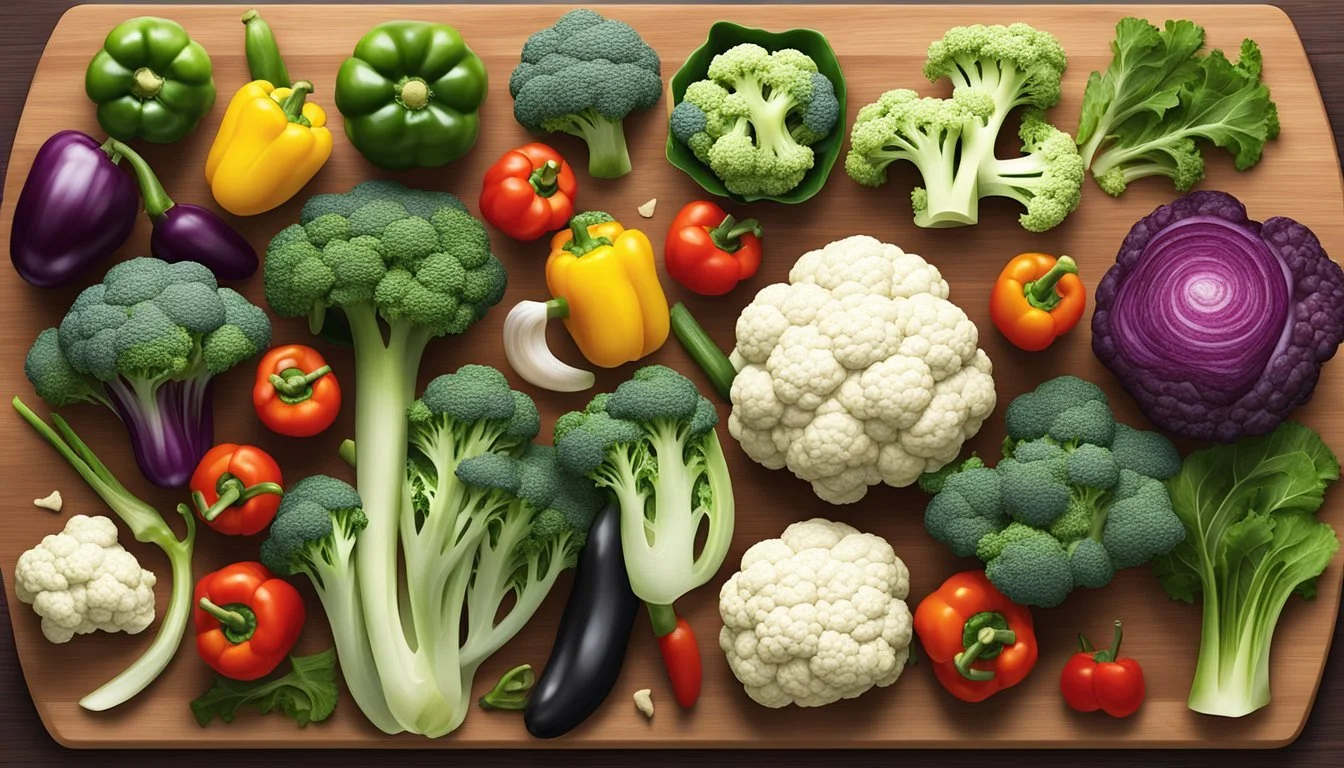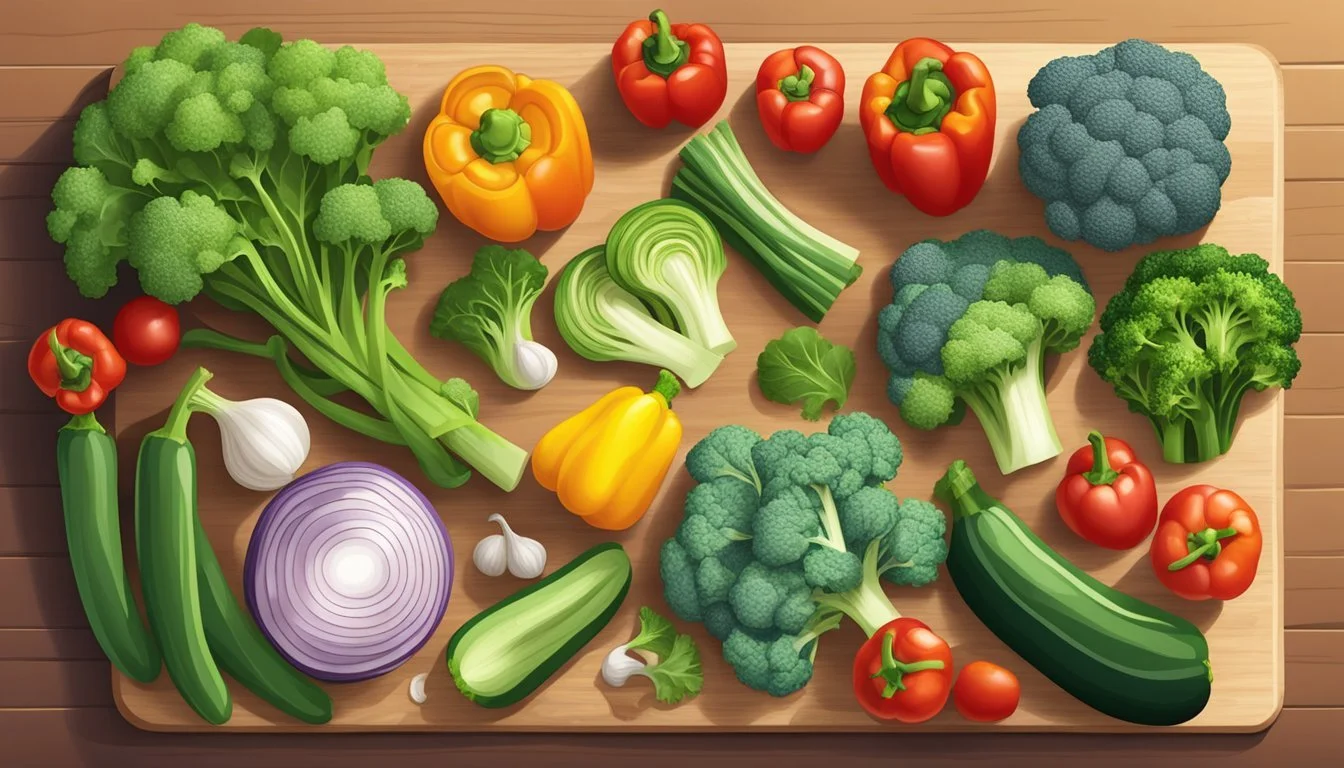Keto Diet: Low-Carb Vegetables to Enhance Your Meal Plan
Adopting a ketogenic, or keto, diet involves reducing carbohydrate intake and upping fat consumption to shift the body's metabolism towards fat and ketones for energy. This nutritional strategy has gained popularity for its potential benefits in weight loss, blood sugar control, and enhanced cognitive function. Central to the adherence to a keto diet are low-carb vegetables that provide essential nutrients without disrupting the metabolic state of ketosis.
Low-carb vegetables are a cornerstone of the keto diet, with a focus on those grown above ground, which generally contain fewer carbs. Leafy greens such as spinach (What wine goes well with spinach?), kale, (What wine goes well with kale?) and lettuce, along with cruciferous vegetables like broccoli (how long does broccoli last?)and cauliflower, are considered keto-friendly options that support a well-rounded nutrient intake. These vegetables offer vitamins, minerals, and fiber, which are vital for maintaining health while cutting back on higher-carb food options.
The strategic selection of vegetables on a keto diet can influence the diet's effectiveness in achieving weight loss and maintaining overall wellness. By prioritizing low-carb options, individuals can enjoy a variety of vegetables that contribute to the fullness without exceeding the daily carb limit essential for sustaining ketosis. As such, those on a keto diet often find themselves balancing the need for nutrient-dense foods with the requirement to minimize carbohydrate intake.
Understanding the Keto Diet
The ketogenic diet emphasizes the intake of fats and a significant reduction in carbohydrates, aiming to enter a metabolic state known as ketosis for weight loss and health benefits.
Fundamentals of Ketosis
Ketosis is a metabolic state where the body efficiently burns fat for energy instead of carbohydrates. When an individual follows a ketogenic diet, their body depletes its carbohydrate stores, leading to the production of ketones. These ketones serve as an alternative energy source for the brain and body.
Role of Carbohydrates and Fats
On the Keto Diet, one's carb intake is typically limited to approximately 20 to 50 grams per day, shifting the body's primary fuel source from carbohydrates to fat. This low-carb approach necessitates a diet rich in fats, moderate in protein, and minimal in carbohydrates, emphasizing foods like meats, fatty fish, nuts, and low-carb vegetables.
Benefits of a Keto Diet
Individuals may embark on a Ketogenic Diet for various benefits, among which weight loss is commonly sought. Additionally, a keto diet can improve blood sugar control for those with type 2 diabetes and enhance cognitive function. However, it should be approached with cautious consideration to avoid potential nutritional deficiencies.
Low-Carb Vegetables on Keto
In a ketogenic diet, the selection of vegetables is crucial due to their differing carbohydrate contents. Understanding which vegetables are low in net carbs and high in fiber can contribute to maintaining ketosis.
Characteristics of Low-Carb Vegetables
Low-carb vegetables are primarily those that grow above ground. They tend to have fewer carbs and are rich in fiber, which can be subtracted from the total carbohydrate count to determine net carbs. Net carbs are essential to track on a keto diet since they impact blood sugar levels and ketosis. A general trait of these vegetables is their nutrient density, offering significant vitamins and minerals while keeping carb counts low.
Vegetables to Embrace on Keto
For those adhering to a keto diet, certain vegetables prove to be both nutritionally beneficial and low in carbohydrates. Here is a list of some preferred options along with their net carb content per 100 grams:
Lettuce: 2g net carbs
Spinach: 1g net carbs
Zucchini: 3g net carbs
Cauliflower: 4g net carbs
Broccoli: 4g net carbs
Bell Peppers: 4g net carbs
Asparagus: 2g net carbs
Kale: 3g net carbs
Green Beans: 4g net carbs
These vegetables are predominantly above-ground growers and should be staples in a keto-friendly pantry.
Vegetables to Avoid on Keto
While increasing vegetable intake is typically encouraged for health, keto dieters need to be wary of below-ground vegetables, commonly known as root or starchy vegetables, due to their higher carb content. Here are examples of vegetables to limit and their respective net carb amounts per 100 grams:
Potatoes: 15g net carbs
Sweet Potatoes: 17g net carbs
Carrots: 7g net carbs
Beets: 6g net carbs
Peas: 14g net carbs
Monitoring intake of these vegetables is important to prevent exceeding daily carb limits and disturbing the balance of ketosis.
Nutritional Benefits of Vegetables
Vegetables play a pivotal role in the keto diet, offering nutritional benefits such as essential vitamins, minerals, fiber, and antioxidants while remaining low in carbohydrates.
Vitamins and Minerals in Vegetables
Vegetables are a vital source of vitamins and minerals that support overall health. Leafy greens, for instance, are rich in Vitamin K, essential for blood clotting and bone health. Vegetables like bell peppers (What wine goes well with bell peppers?) and broccoli provide substantial amounts of Vitamin C, crucial for immune function and skin health. Moreover, sources like spinach are high in Iron, a key component for blood production.
Vitamin K: Found in kale, spinach, and other leafy greens.
Vitamin C: Abundant in bell peppers, broccoli, and Brussels sprouts.
Iron: Present in spinach and kale.
Calcium: Crucial for bone health and found in broccoli and kale.
Potassium: Supports nervous system functions and is found in avocados and spinach.
Importance of Fiber
Vegetables are an excellent source of Fiber, which is indispensable for digestive health. Fiber aids in maintaining bowel regularity and can help in managing blood sugar levels. It is an important nutrient for those on a ketogenic diet as it assists in keeping one satiated without adding extra carbohydrates.
Example: A cup of chopped broccoli contains approximately 2.4 grams of fiber.
Fiber role: Supports digestion and helps in prolonged satiety.
Vegetables with High Antioxidants
Antioxidants present in vegetables are compounds that help protect the body from oxidative stress and inflammation. These nutrient-dense foods are low in calories but high in vitamins and minerals. For example, vegetables such as red cabbage and artichokes are packed with antioxidants.
Antioxidant-rich Vegetables: Include artichokes, red cabbage, and bell peppers.
Benefits: Protect against free radicals and may lower the risk of chronic diseases.
Incorporating Vegetables into a Keto Diet
Making the right vegetable choices is crucial on a keto diet to maintain ketosis. Selecting low-carb vegetables and preparing them with keto-friendly methods will ensure they complement the high-fat, moderate-protein framework of the diet.
Salads and Side Dishes
On a ketogenic diet, salads are a staple. They should feature prominently above-ground vegetables, which typically contain fewer carbs. For instance, a cup of spinach only contains 1 gram of net carbs. Salads can be enriched with kale, lettuce, or cucumbers, and for added variety, diced bell peppers give color and crunch with just about 4 grams of carbs per cup. Side dishes often include steamed vegetables such as broccoli or cauliflower, which can be mashed as a low-carb alternative to potatoes.
Keto-Friendly Vegetable Recipes
Creating recipes that focus on vegetables suitable for a keto diet is important. Cauliflower stands out as a versatile ingredient, often used to make rice, pizza crusts, or even cauli-tots. Broccoli, on the other hand, can be used in casseroles or stir-fries, making sure it's cooked in keto-approved fats such as butter, ghee, or coconut oil. Include olives for their healthy fats in dishes or as a garnish.
Seasoning and Dressings
While preparing vegetables, the choice of seasoning and dressings should comply with keto guidelines. Using olive oil as a base for dressings adds healthy fats and enhances flavor without increasing carb intake significantly. Homemade dressings utilizing herbs and spices over store-bought varieties avoid unnecessary sugars and carbs. A cream sauce, heavily based on cheese and cream, can be a delightful addition to greens and other keto vegetables, turning an ordinary dish into a satisfying meal.
Specific Low-Carb Vegetables Explored
Selecting the right vegetables is crucial for maintaining ketosis on a keto diet. This section examines specific low-carb vegetables conducive for the keto lifestyle.
Leafy Greens: Spinach, Kale, and Lettuce
Spinach is a versatile leafy green with minimal carbs, making it ideal for keto-friendly dishes. Whether it is added to salads, sautéed, or blended into shakes, its nutrient density is a significant advantage. Kale offers similar benefits, with a slightly different flavor profile suitable for chips or as a robust salad base. Romaine lettuce and arugula are other low-carb options, frequently used in salads and wraps.
Cruciferous Vegetables: Broccoli and Cauliflower
Broccoli and cauliflower are two cruciferous vegetables low in net carbs yet high in fiber and vitamin C. These can be prepared in various ways, including steaming, roasting, or riced, making them a keto-friendly substitute for traditional starches. Brussels sprouts (how long do brussels sprouts last?)and cabbage also fall into this category, offering diversity in meal planning.
Additional Keto-Friendly Vegetables
The keto diet embraces a range of other vegetables:
Asparagus and Zucchini: These can be grilled or spiralized into noodles.
Bell Peppers and Green Beans: These add color and crunch to meals.
Celery, Bok Choy, and Swiss Chard: These are suitable for soups or stir-fries.
Avocado: Although technically a fruit, it’s rich in healthy fats and low in carbs.
Mushrooms and Radishes: These are flavorful additions without many carbs.
Eggplant: It’s a meaty vegetable that can be used in various dishes, from keto lasagna to dips.
Common Questions about Vegetables and Keto
When adopting a ketogenic diet, individuals often wonder which vegetables are suitable and how they can be incorporated into their meal plans. This section will address common queries related to starchy vegetables, legumes, and managing overall carbohydrate intake.
Solving the Starchy Vegetable Dilemma
Starchy vegetables like corn, sweet potatoes, and certain root vegetables have higher carbohydrate counts which can be problematic for maintaining ketosis. For instance:
Sweet Potatoes: Approximately 20 grams of carbs per 100 grams
Corn: Around 19 grams of carbs per 100 grams
These options are typically limited on a ketogenic diet. Instead, individuals are encouraged to opt for non-starchy, above-ground vegetables such as tomatoes and leafy greens, which have lower carb counts and can fit into a keto framework.
Can I Eat Legumes on Keto?
Legumes, encompassing various beans, lentils, and peas, are rich in nutrients but also high in carbohydrates. For a ketogenic diet, most legumes are avoided due to their carb content:
Legume Carbs per 100 grams Lentils 20 g Black beans 24 g Peas 14 g
Smaller portions of these may be considered by some, but generally, they are not included in a strictly low-carb diet. Individuals who wish to include legumes must carefully manage portions to stay within their daily carb counts.
Managing Carb Counts in Meals
By knowing the carb counts of vegetables, one can craft meals that support ketosis. For instance, non-starchy vegetables such as tomatoes (approx. 3 grams of carbs per 100 grams) and onions (approx. 9 grams of carbs per 100 grams) can be included in moderation. It's common practice to eliminate or minimize sugary condiments and dressings that may add hidden sugar and carbs to vegetable dishes.
For those wanting to include some higher-carb vegetables as exceptions to the rule, they should do so sparingly, always keeping in mind the total carbohydrate limit for the day. Tracking and adjusting one's intake is crucial to successfully follow a ketogenic diet.
Health Considerations and the Keto Diet
The ketogenic diet has been studied for its effects on various health conditions, including heart disease, diabetes, and cancer. This section examines the scientific evidence related to these areas.
The Impact of Keto on Heart Disease and Diabetes
The ketogenic diet reduces carbohydrate intake, which typically leads to lower glucose levels in the blood. This reduction in circulating glucose can be beneficial for individuals with type 2 diabetes, as it may improve glycemic control and reduce the need for medication. Concerning heart disease, the high intake of fats on a keto diet has raised questions. However, it is suggested that the increased consumption of healthy, unsaturated fats may have a neutral or possibly beneficial effect on heart health. Scientific references indicate that weight loss associated with the ketogenic diet may also lead to improved cholesterol levels, which can be advantageous for heart health.
Reduction in blood glucose: Beneficial for diabetes management.
Weight loss: Potential improvement in cholesterol levels, positive for heart health.
Types of fats: Unsaturated fats are favored over unhealthy saturated fats.
Keto Diet and Cancer Research
Research has begun to explore the ketogenic diet's role in cancer treatment, with the hypothesis that lowering glucose availability could inhibit the growth of certain cancer cells. While some laboratory and animal studies indicate potential benefits, human trials are limited, and firm conclusions cannot yet be drawn. Cancer cells often exhibit altered metabolism, and it is theorized that a keto diet could interrupt the energy supply to these cells. Nonetheless, researchers urge caution until comprehensive clinical trials are conducted.
Glucose reduction: May inhibit some cancer cell growth.
Altered cancer cell metabolism: A target for ketogenic dietary interventions.
Keto and Long-Term Health: What We Know
The long-term effects of the ketogenic diet on general health are still under investigation. Given that the diet is relatively high in fats, its impact on cardiovascular health continues to be a crucial research area. Most studies are short-term and more extensive, long-term studies are needed to fully understand the implications of the keto diet over extended periods. Current evidence suggests that a well-formulated ketogenic diet, rich in non-starchy vegetables and healthy fats, can be part of a balanced strategy for weight loss and may have positive effects on certain chronic conditions. Nonetheless, individuals must consult healthcare professionals before making significant dietary changes, particularly those with pre-existing health conditions.
Long-term research: Needed to ascertain comprehensive health impacts.
Balanced diet: Essential for positive long-term health outcomes.
Professional guidance: Recommended before adopting a ketogenic lifestyle.




